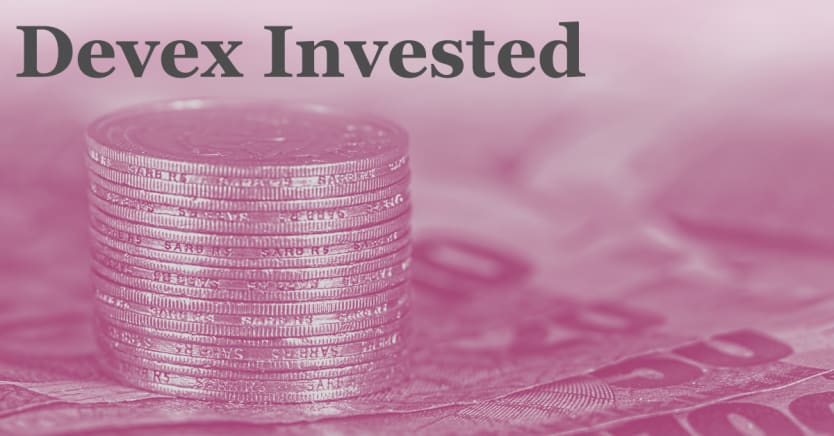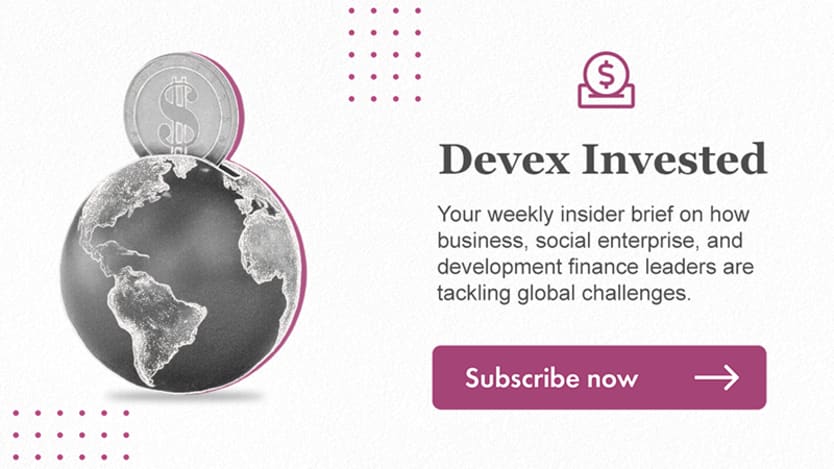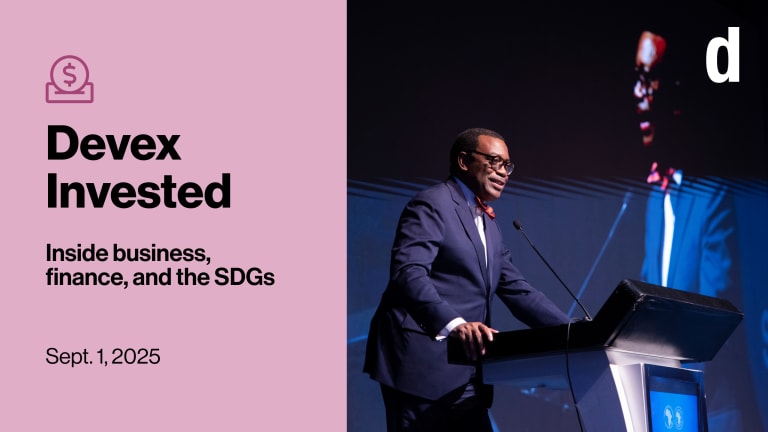
This year’s World Bank-IMF Spring Meetings took place in the shadow of a world divided. There were none of the usual public signs of unity: no joint communiqué from the G-20, nothing from IMF’s top body, and silence from the World Bank’s Development Committee. Some world leaders walked out of a G-20 meeting because Russia was present.
The main concerns were the Ukraine conflict, the food crisis, and the debt burden. No solutions were found, but we heard a lot of gloom.
This is a preview of Devex Invested
Sign up to this weekly newsletter inside business, finance, and the SDGs, in your inbox every Tuesday.
• There was growing talk about deglobalization. Much like the inflationary environment that is spiking food prices, the idea that the world is not destined to grow ever closer is perhaps a throwback to the reality of decades ago.
• Attendees were concerned about not only the sharp increases in fertilizer costs and food prices — which have soared 37% year over year, Shabtai reports — but also the prospect of unrest. Overall, global growth is slowing, dragged down in part by Russia’s invasion of Ukraine.
• Ukrainian President Volodymyr Zelenskyy made a virtual appearance and was warmly welcomed — though not by Russia. He ended his speech by calling for the World Bank to hold a future meeting in a Ukrainian city rebuilt through international support. The country will need $5 billion to $7 billion per month just to keep running, officials said during the meetings. Reconstruction, even if the war ends immediately, will cost hundreds of billions of dollars.
• There were some tough words from U.S. Treasury Secretary Janet Yellen and climate envoy John Kerry on the need for the multilateral development banks to step up on climate finance, as Adva reported. But the issue has been partially moved to the back burner. The expectations for COP 27 in November are not optimistic, attendees told Shabtai.
• Indonesia finds itself in the unenviable position of leading the G-20 during this turbulent period. The Spring Meetings saw no movement on key issues that the global body has been called on to solve, such as the worsening debt crisis.
• In an interview with Shabtai, the World Bank’s managing director of operations stressed that the institution will remain focused on its long-term goal of fighting poverty while also dealing with the many immediate crises. The bank is aiming to mobilize $50 billion in emergency assistance this quarter and hopes to get to $170 billion by mid-2023.
• The head of the African Development Bank, Akinwumi Adesina, tells Shabtai he is worried that “hungry people are angry people,” with food security a major concern.
Your next job?
Global Sustainable Finance Impact Markets Associate
Morgan Stanley & Co. LLC
United States
Was there an upside to the Spring Meetings? Well, people did enjoy having more face-to-face time, even though much of the event was hybrid. And IMF confirmed that it got $40 billion for the new Resilience and Sustainability Trust, with the aim of operationalizing loans by October. The RST fund will support long-term financing for climate and pandemic preparedness.
And don’t miss: How the World Bank’s work on digitalization is evolving
Sharp turns ahead
The Ukraine conflict and COVID-19 have overshadowed climate concerns and the Sustainable Development Goals, and the international community doesn’t have any easy ways to deal with the current situation, European Investment Bank President Werner Hoyer tells Adva. Still, as chair of the multilateral development bank group this year, he’s pushing for greater cooperation and asking the institutions to step up, he says.
EIB president: No 'easy instruments' but MDBs must step up
Read: A Q&A with EIB leadership on climate finance, EIB Global, and what’s next (Pro)
Staying the course
Emmanuel Macron won reelection and will remain France’s president, likely continuing his legacy of embracing multilateralism and increasing the country’s aid budget. Our colleague Miguel Antonio Tamonan has an overview of French aid to help you understand the policy trends.
French aid: A primer (Pro)
+ Devex Pro subscribers can also learn what the presidential election could mean for development aid. Not gone Pro yet? Sign up and start your 15-day free-trial.
Your two cents
Do you have thoughts on how to improve this newsletter? We want to hear about what you’d like us to cover more — or less. Please take a few minutes to fill out our survey.
Photo op
In a statement released Monday, the leaders of more than a dozen DFIs pledged to increase collaboration on infrastructure development.
What we’re reading
What we know about Prince Harry and Meghan’s Archewell Foundation. [Devex Pro]
Adeso aims to spin $5 million Scott grant into endowment, web platform. [Devex]
What companies’ financial documents say about climate change. [TIME]
The push for shareholder democracy should be accelerated. [The Economist]










